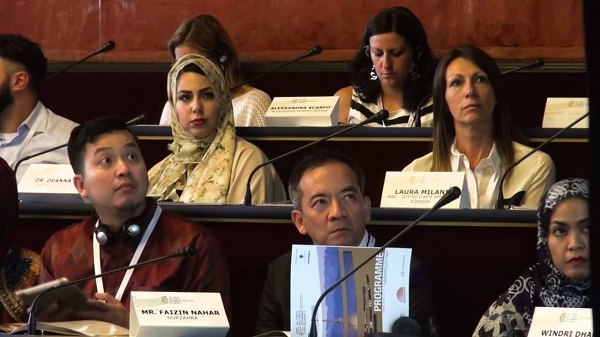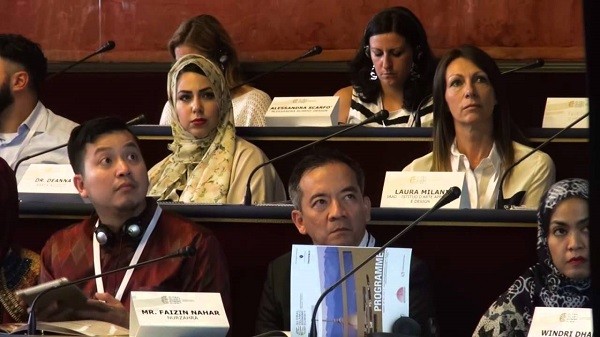

By: zawya.com
Source: ZAWYA
The Italian city of Turin hosted leading Islamic and modest fashion brands at a one-day roundtable that addressed critical key challenges and opportunities in the global Islamic economy sector.
The event was held at a time when global Muslim consumer spending on clothing and footwear reached $266 billion in 2013, representing 11.9% of global clothing and footwear expenditure. If this market were a country, it would be ranked third after the largest two in the world – the U.S. ($494 billion) and China ($285 billion). Muslim expenditure on clothing is expected to reach $488 billion by 2019.
Top countries with Muslim consumer consumption (based on 2013 data) are Turkey ($39.3 billion), UAE ($22.5 billion), Indonesia ($18.8 billion), and Iran ($17.1 billion). Within this larger Muslim consumer spend on clothing, the modest fashion industry is growing rapidly.
However, the modest fashion market is fragmented and this has created challenges for market players in different countries to scale and expand cross-border. In order to leverage the rapidly growing profile of, and demand for modest fashion, the Turin roundtable discussions have started the ball rolling on furthering actionable outcomes to address specific key issues:
1) The need to map the global modest fashion ecosystem to gain clear visibility of all participants, from designers to retailers, in order to identify weak points and leverage on strengths.
2) The need to identify end-to-end ethical business practices and processes in order to uphold the Islamic mandates of transparency, fairness, and equity
Piero Fassino, Mayor of Turin said: “Torino has been the first capital of Italy and from that experience it has developed the knowledge and awareness of beauty. For this reason it has also been the first capital of fashion in Italy. We are pleased to host here in Turin and for the first time in Europe a modest fashion roundtable.”
Led by Abdullah Al-Awar, CEO of Dubai Islamic Economy Development Centre (DIEDC), the summit drew the participation of senior executives from DIEDC, Dubai Chamber as well as Thomson Reuters – co-hosts of the summit. Representatives from Dubai included DIEDC’s Project Director Dr. Sayd Farook, as well as Head of Strategy & Planning Saeed Kharbash, and Project Manager of Dubai Chamber Maysa Humadi.
In a keynote address, Abdullah Al Awar, CEO of DIEDC, said, “When the strategy Dubai Capital of Islamic Economy was launched, many people were surprised that fashion and clothing were identified as key pillars of the strategy. Back then, it was widely perceived that the Islamic economy comprised primarily of Islamic finance and halal foods. The reality, however, is that the Islamic economy encompasses all economic sectors driven by Muslims’ adherence to some form of faith-based activity and that has market impact.”
He added: “Modest fashion is growing, and not only becoming an important part of the global Islamic economy sector but a key element of the vast clothing and accessories industry and value-chain worldwide. While the Islamic clothing market is still a niche market, there is an opportunity for Islamic fashion to impact and cross over into the mainstream fashion sphere, appealing to non-Muslims, as well as Muslims. Events such as the Turin roundtable are important to identify solutions to the challenges in this space, in addition to providing a platform for discussing the opportunities and sharing ideas and best practices.”
Mustafa Adil, Acting Head of Islamic Finance, Thomson Reuters , said, “The Turin roundtable has pointed out the pressing need to gain a clearer picture of the modest fashion industry if all stakeholders are to more effectively leverage the strengths of the industry value chain and eliminate the challenges to its growth .”
He continued, “The outcomes of the Turin roundtable will be documented in a white paper and released publicly. The white paper will offer guidelines for all policy makers and stakeholders on the steps needed to be taken for enriching the modest fashion ecosystem and further advancing the global Islamic economy.”
Key findings from the Turin roundtable are expected to be shared at the Global Islamic Economy Summit in Dubai. Dubai Chamber of Commerce and Industry’s two day event, organised in partnership with Thomson Reuters and co-hosted by DIEDC, will run from 5 – 6 October focusing on the success of brands and services within the Islamic economy sector.
The UAE, China, and Italy lead the Modest Fashion Indicator (MFI), which evaluates the status and development of the modest fashion ecosystem in 72 countries. The MFI was first introduced in the Global Islamic Economy Report 2014/2015 by Thomson Reuters and DinarStandard. The Index measures three metrics: supply drivers relative to country size (clothing export to OIC countries); awareness (number of news articles and events); and social (clothing pricing index and labour fairness index).



